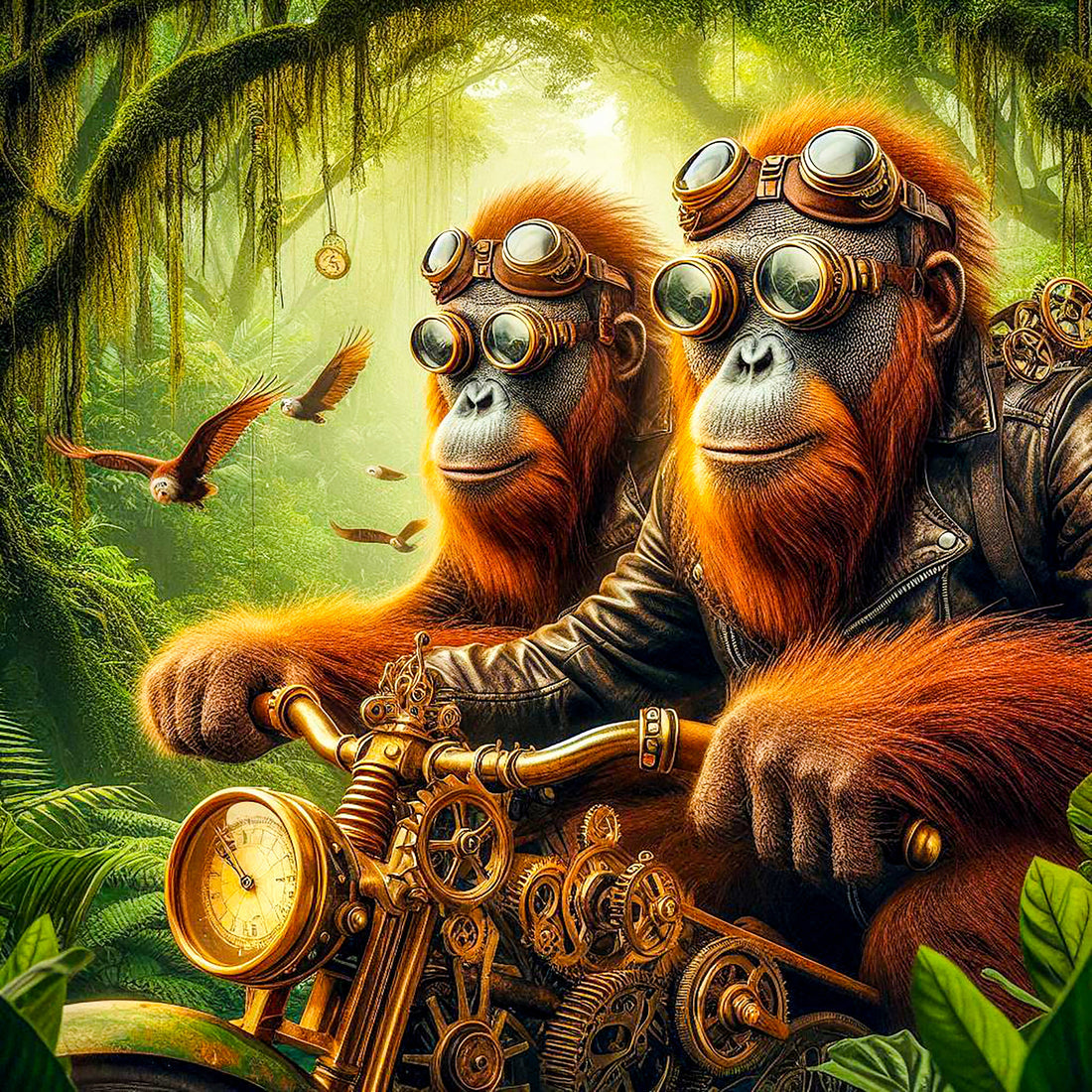
Orangutans
Share
Species Overview:
There are three distinct species of orangutans:
1. Bornean Orangutan (Pongo pygmaeus): Native to Borneo, this species has several subspecies and is the largest of the orangutans.
Physical Characteristics:
• Size: Male orangutans are significantly larger than females, reaching heights of up to 5 feet and weighing around 200 pounds, while females typically weigh around 100 pounds.
• Distinctive Fur: Orangutans are easily recognized by their red-orange fur, a rare color among primates and well-suited for the light-dappled rainforest.
• Facial Features: Males have prominent cheek pads, known as flanges, and throat pouches, which amplify their calls. These features become more pronounced with age and play a role in dominance and mating.
Behavior and Social Structure:
• Solitary Lifestyle: Unlike other great apes, orangutans are primarily solitary. They have loose social structures, with males often traveling alone and females staying with their offspring.
• Maternal Bonds: Mothers are highly dedicated, caring for their young for up to 8-9 years—the longest infant dependency period of any animal. This bond helps young orangutans learn essential survival skills.
• Communication: Orangutans use a variety of vocalizations, gestures, and facial expressions to communicate. Adult males use long calls to establish territory, attract females, and deter other males.
Diet and Foraging:
• Frugivorous Diet: Orangutans are primarily frugivores, with fruit making up the majority of their diet. They especially love durian, despite its strong odor.
• Seasonal Adaptations: When fruit is scarce, they adapt by eating bark, leaves, insects, and other forest foods, demonstrating remarkable dietary flexibility.
• Tool Use: Known for their intelligence, orangutans sometimes use sticks to retrieve insects or extract seeds, and leaves as makeshift gloves or napkins.
Habitat and Adaptations:
• Arboreal Lifestyle: Orangutans are highly adapted to life in the trees, where they spend most of their time. Their long arms, which can span up to 7 feet, and strong grasping hands and feet make them adept at swinging through the canopy.
• Nest Building: Every evening, orangutans build new nests high in the trees using branches and leaves. They sometimes add “pillows” or cover the nests with leaves if it rains, showing a sense of comfort and adaptability.
• Forest Dependency: Orangutans are critical to their rainforest ecosystems, acting as “gardeners” by dispersing seeds through their droppings, which helps maintain forest diversity.
Conservation Status:
• Endangered and Threatened: All three species of orangutans are critically endangered, with population declines due to deforestation, illegal pet trade, and hunting.
• Habitat Loss: The greatest threat to orangutans is habitat loss, especially from logging and the conversion of rainforests to palm oil plantations. Palm oil, used in many everyday products, is a leading cause of deforestation in Southeast Asia.
• Conservation Efforts: Conservation groups work to protect habitats, rehabilitate orphaned or displaced orangutans, and support sustainable land use. Educating the public about palm oil’s impact and promoting certified sustainable palm oil (CSPO) are key components of conservation efforts.
Intelligence and Tool Use:
• Problem-Solving Abilities: Orangutans are remarkably intelligent, known for their ability to use tools, solve puzzles, and learn complex tasks in captivity.
• Cultural Behaviors: Different groups of orangutans exhibit unique behaviors, such as specific vocalizations or foraging techniques, indicating a form of “cultural learning” passed from one generation to the next.
• Captive Learning: In captivity, orangutans can learn to mimic human actions, use sign language, and even create simple tools, demonstrating both intelligence and curiosity.
Interesting Facts:
• Longest-Living Great Ape: Orangutans have a long lifespan, often reaching 30-40 years in the wild and up to 50-60 years in captivity.
• Slow Life Cycle: Orangutans reproduce slowly, with females giving birth about every 7-9 years, which contributes to their vulnerability to population decline.
• Strong Memory: Orangutans have impressive memories, especially for remembering food locations and seasonal fruiting patterns, which aids in their survival.
Summary:
CyberMutz.com (Dog-Themed Apparel & Accessories)
“CyberMutz.com – Explore a unique collection of dog-themed apparel, accessories, and gifts for pet lovers. Shop stylish, high-quality designs featuring your favorite dog breeds!” Category Page Descriptions: Dog Breed T-Shirts: “Show off your love for dogs with our exclusive breed-themed T-shirts. From German Shepherds to Chihuahuas, find high-quality, comfortable tees celebrating your favorite pup!” Dog Breed Pet Tank Tops: “Keep your furry friend stylish and comfortable with our dog breed-themed pet tank tops. Perfect for small and large dogs, these unique designs are a must-have!” Funny Dog-Themed Apparel: “Love dogs and humor? Our funny dog-themed apparel blends style with witty canine-inspired designs. Shop now for T-shirts, hoodies, and more!” Personalized Dog Merchandise: “Customize your dog lover’s gear with our personalized pet-themed apparel and accessories. Create a one-of-a-kind look for yourself or a perfect gift for a fellow dog enthusiast!”
CyberPussyKatz.com (Cat-Themed Apparel & Accessories)
“CyberPussyKatz.com – Celebrate your love for cats with our premium collection of feline-inspired apparel and accessories. Purr-fect designs for every cat lover!” Category Page Descriptions: Cat Breed T-Shirts: “Showcase your favorite feline friend with our stylish cat breed-themed T-shirts. From Maine Coons to Siamese, find the perfect tee for cat lovers!” Funny Cat-Themed Apparel: “Express your quirky side with our funny cat-themed T-shirts, hoodies, and more. Pawsome designs for those who love cats and humor!” Personalized Cat Merchandise: “Make it personal with custom cat-themed apparel and accessories. Create a unique gift or a special piece just for you!”
CyberMunkiez.com (Monkey-Themed Apparel & Accessories)
“CyberMunkiez.com – A fun collection of monkey-inspired apparel and accessories. Perfect for primate lovers who enjoy bold, playful, and unique designs!” Category Page Descriptions: Monkey-Themed T-Shirts: “Go bananas over our monkey-themed T-shirts! Whether you love capuchins, chimps, or gorillas, our designs bring out your wild side.” Funny Primate Apparel: “Add a touch of humor to your wardrobe with our hilarious monkey and ape-inspired apparel. Great for animal lovers and jungle enthusiasts!” Custom Monkey Merchandise: “Make it yours! Personalize your favorite monkey designs on T-shirts, hoodies, and more for a one-of-a-kind look.”
